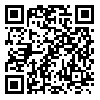Volume 14, Issue 14 (Second Special Issue 2015)
Modares Mechanical Engineering 2015, 14(14): 251-261 |
Back to browse issues page
Download citation:
BibTeX | RIS | EndNote | Medlars | ProCite | Reference Manager | RefWorks
Send citation to:



BibTeX | RIS | EndNote | Medlars | ProCite | Reference Manager | RefWorks
Send citation to:
Aghajany H, Habibnia M, Jamshidi Aval H. Study on Frictional Heat Behavior and Material Flow during Friction Stir Welding Of AA1100 Aluminum Alloy. Modares Mechanical Engineering 2015; 14 (14) :251-261
URL: http://mme.modares.ac.ir/article-15-7833-en.html
URL: http://mme.modares.ac.ir/article-15-7833-en.html
Abstract: (6609 Views)
In this article, effects of Friction stir welding tool rotational and traverse speeds were studied on the temperature distribution, material flow and formation of defects in the welding zone. Computational fluid dynamics method was used to simulate the process with commercial CFD Fluent 6.4 package. To enhance the accuracy of simulation in this Study, the welding line that is located between two workpieces, defined with pseudo melt behavior around the FSW pin tool. Simulation results showed that with increase of FSW tool rotational speed to linear speed, the material flow in front of tool became more and dimensions of the stir zone will be bigger. The calculation result also shows that the maximum temperature and stir of the material was occurred on the advancing side. The computed results showed that with incompetent heat generation, insufficient material flow caused around the pin and defects formed in weld root. The computed results were in good agreement with the experimental results of other researchers. Based on the welding parameters that used in this simulation, the maximum strain rate is predicted between -4(S-1) to +4(S-1) in the stir zone.
Article Type: Research Article |
Subject:
Welding|CFD
Received: 2014/06/15 | Accepted: 2014/07/30 | Published: 2014/10/15
Received: 2014/06/15 | Accepted: 2014/07/30 | Published: 2014/10/15
| Rights and permissions | |
 |
This work is licensed under a Creative Commons Attribution-NonCommercial 4.0 International License. |







